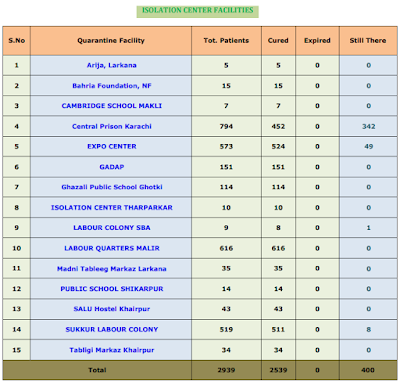By Mukhtar Alam
(Pakistan News & Features Services)
(Pakistan News & Features Services)
Karachi endured an average of 38 COVID-19 deaths daily during the week ending on July 12 when the provincial health authorities confirmed 48 new fatalities, with 1,713 new infections, taking the death toll to 1,795 and overall infection number to 105,533 for Sindh.
Among the latest COVID-19 fatalities, 47 were registered at hospitals or homes in Karachi, while the 48th death was reported from Hyderabad.
Karachi’s overall case fatality rate came as almost two percent, against an overall rate of about one percent for the entire districts of Sindh, excluding six districts of Karachi.
Keen observers understand that the provincial government and particularly the Sindh health department needed to act proactively to meet the challenge.
The Karachiites have indeed remained puzzled and aggrieved by the continued outburst of COVID-19 related fatalities at public and private hospitals.
It’s the responsibility of the government now to rush a review of the service delivery and patient management at different hospitals, particularly those reporting deaths frequently or having a patient-load matching not to their equipment and manpower including the special and experienced hands.
According to an official report, updated on July 12, at Karachi, the newly established Infectious Disease Hospital and Research Centre had 16 intensive care unit (ICU) beds with ventilators and 42 high dependency unit (HDU) beds, but none of them was occupied by any COVID-19 patient.
In addition, the Karachi Expo Centre coronavirus facility had 10 ICU beds and 116 HDU beds vacant, Social Security Kidney Hospital had 11 ICU beds unoccupied, Kulsoom Bai Valika Hospital had 12 ICU and 12 HDU beds vacant, DUHS Hospital had 62 HDU beds vacant, Services Hospital had 40 HDU beds vacant, AKU Hospital had 23 HDU beds vacant, CHK had 117 HDU beds vacant, Lyari General Hospital had 145 HDU beds vacant and Ziauddin Hospital, North Nazimabad, had 23 HDU beds vacant, among others.
Those who died during the last 24 hours ending on afternoon of July 12 included 33 men and 15 women.
The COVID-19 infected men (33 in number) who lost their lives at Karachi aged from 35 to 88 years, while 14 women deceased were in the age brackets of 30 to 88 years. A 35-year old woman died at Hyderabad.
However, the health department officials or other government functionaries were silent over the hospital or home status of the people who succumbed to COVID-19.
A hospital wise distribution of deaths that occurred in Karachi, as of July 11, showed that 106 COVID-19 patients died at AKUH, 187 died at CHK, 129 at Indus Hospital, 192 at JPMC, 185 at DUHS Hospital, 144 at SIUT, 73 at Trauma Centre, 74 at Ziauddin Hospital (ZU) North Nazimabad, 47 at ZU Hospital North Nazimabad, 55 at Lyari General Hospital, among others.
A provincial health department summary revealed that as many as 10,276 new samples were tested by various COVID laboratories across the province during the last 24 hours.
Karachi reported the maximum 963 new cases, followed by Khairpur (172), Shikarpur (59), Larkana (59), Matiari (55), Mirpurkhas (50), Ghotki (41), Sanghar (37), Jamshoro (35), Dadu (32), Kambar Shadadkot (32), Tando Mohammad Khan (31), Thatta (27), Tando Allahyar (21), Badin (19), Jacobabad (19), Kashmore (15), Umerkot (11), Shaheed Benzirabad (10), Sukkur (8), Hyderabad (7), Naushero Feroze (7), Sujawal (2) and Tharparkar (1).
In addition, the Karachi Expo Centre coronavirus facility had 10 ICU beds and 116 HDU beds vacant, Social Security Kidney Hospital had 11 ICU beds unoccupied, Kulsoom Bai Valika Hospital had 12 ICU and 12 HDU beds vacant, DUHS Hospital had 62 HDU beds vacant, Services Hospital had 40 HDU beds vacant, AKU Hospital had 23 HDU beds vacant, CHK had 117 HDU beds vacant, Lyari General Hospital had 145 HDU beds vacant and Ziauddin Hospital, North Nazimabad, had 23 HDU beds vacant, among others.
Those who died during the last 24 hours ending on afternoon of July 12 included 33 men and 15 women.
The COVID-19 infected men (33 in number) who lost their lives at Karachi aged from 35 to 88 years, while 14 women deceased were in the age brackets of 30 to 88 years. A 35-year old woman died at Hyderabad.
However, the health department officials or other government functionaries were silent over the hospital or home status of the people who succumbed to COVID-19.
A hospital wise distribution of deaths that occurred in Karachi, as of July 11, showed that 106 COVID-19 patients died at AKUH, 187 died at CHK, 129 at Indus Hospital, 192 at JPMC, 185 at DUHS Hospital, 144 at SIUT, 73 at Trauma Centre, 74 at Ziauddin Hospital (ZU) North Nazimabad, 47 at ZU Hospital North Nazimabad, 55 at Lyari General Hospital, among others.
A provincial health department summary revealed that as many as 10,276 new samples were tested by various COVID laboratories across the province during the last 24 hours.
Karachi reported the maximum 963 new cases, followed by Khairpur (172), Shikarpur (59), Larkana (59), Matiari (55), Mirpurkhas (50), Ghotki (41), Sanghar (37), Jamshoro (35), Dadu (32), Kambar Shadadkot (32), Tando Mohammad Khan (31), Thatta (27), Tando Allahyar (21), Badin (19), Jacobabad (19), Kashmore (15), Umerkot (11), Shaheed Benzirabad (10), Sukkur (8), Hyderabad (7), Naushero Feroze (7), Sujawal (2) and Tharparkar (1).






